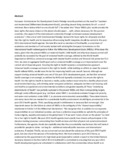| dc.description.abstract | European Commissioner for Development Andris Piebalgs recently pointed out the need for "updated and modernized [Millennium Development Goals], providing decent living standards for all - a set of minimum floors below which no one should fall".1 He added that "these 'MDGs plus' would provide the basic rights that every citizen on the planet should expect ... with, where necessary, for the poorest countries, the support of the international community through continued overseas development assistance".1
We concur with Commissioner Piebalgs' demand for basic rights for all people and feel that the right to health and its imperative of narrowing health inequities should be central to the post-2015 international health agenda. We take this stand as members of Go4Health, a consortium of academics and members of civil society tasked with advising the European Commission on the international health-related goals to follow the Millennium Development Goals (MDGs). What does this mean, given that the present MDGs on maternal health, child health and infectious disease control will probably be succeeded by the goal of universal health coverage, defined by the World Health Organization (WHO) as universal coverage with needed health services and financial risk protection?2,3
First, we view an aggregate health goal such as universal health coverage as an improvement over the current set of disparate goals. Ensuring the right to health requires a comprehensive approach. Universal health coverage anchored in the right to health, while building on efforts to meet the present health-related MDGs, would raise the bar for improving health care overall.
Second, although we support making universal health care one of the post-2015 development goals, we feel that universal health coverage is not enough, as defined by WHO and typically conceived,3 to ensure the right to health. For the right to health to become a reality, policy-makers must strive for a healthy physical and social environment (e.g. safe drinking water and good sanitation, adequate nutrition and housing, safe and healthy occupational and environmental conditions and gender equality.)4 These "underlying determinants of health" are partially captured in the present MDGs and their corresponding targets, although under different goals (e.g. nutrition under MDG 1, to eradicate extreme hunger and poverty, and water and sanitation under MDG 7, to promote environmental sustainability). These determinants and many more that are needed for a sustainable healthy environment should figure prominently in the post-2015 health agenda.
Third, specifying people's entitlements is necessary but not enough. One important reason for the failure to attain all MDGs is the ambiguity of the "shared responsibility" mentioned in Article 2 of the Millennium Declaration: "We recognize that, in addition to our separate responsibilities to our individual societies, we have a collective responsibility to uphold the principles of human dignity, equality and equity at the global level."5 If we want "every citizen on the planet" to claim his or her right to health, the post-2015 health agenda must specify how citizens will participate in the decision making processes surrounding their health services and their physical and social environment. Furthermore, the agenda should also explicitly describe the accountability mechanisms that will make it possible for people to claim - not beg for - additional national public resources and international assistance, if needed.
Finally, we are concerned not just about the substance of the post-2015 health goals, but also about the process of formulating them. We have entered a post-2015 frenzy, as evidenced by the appointment of a high-level panel expected to submit a report to the United Nations Secretary-General in the first half of 2013.6 Go4Health is committed to ensuring that any post-2015 health development goals are articulated in collaboration with the communities whose health is at stake. However, truly participatory consultations take time and require a continuing relationship among researchers, governments and those communities. Such an approach should be adopted to prevent goals from being formulated by policy elites after token and superficial consultations, which would be at odds with the rights that must underpin the new goals. | en |

